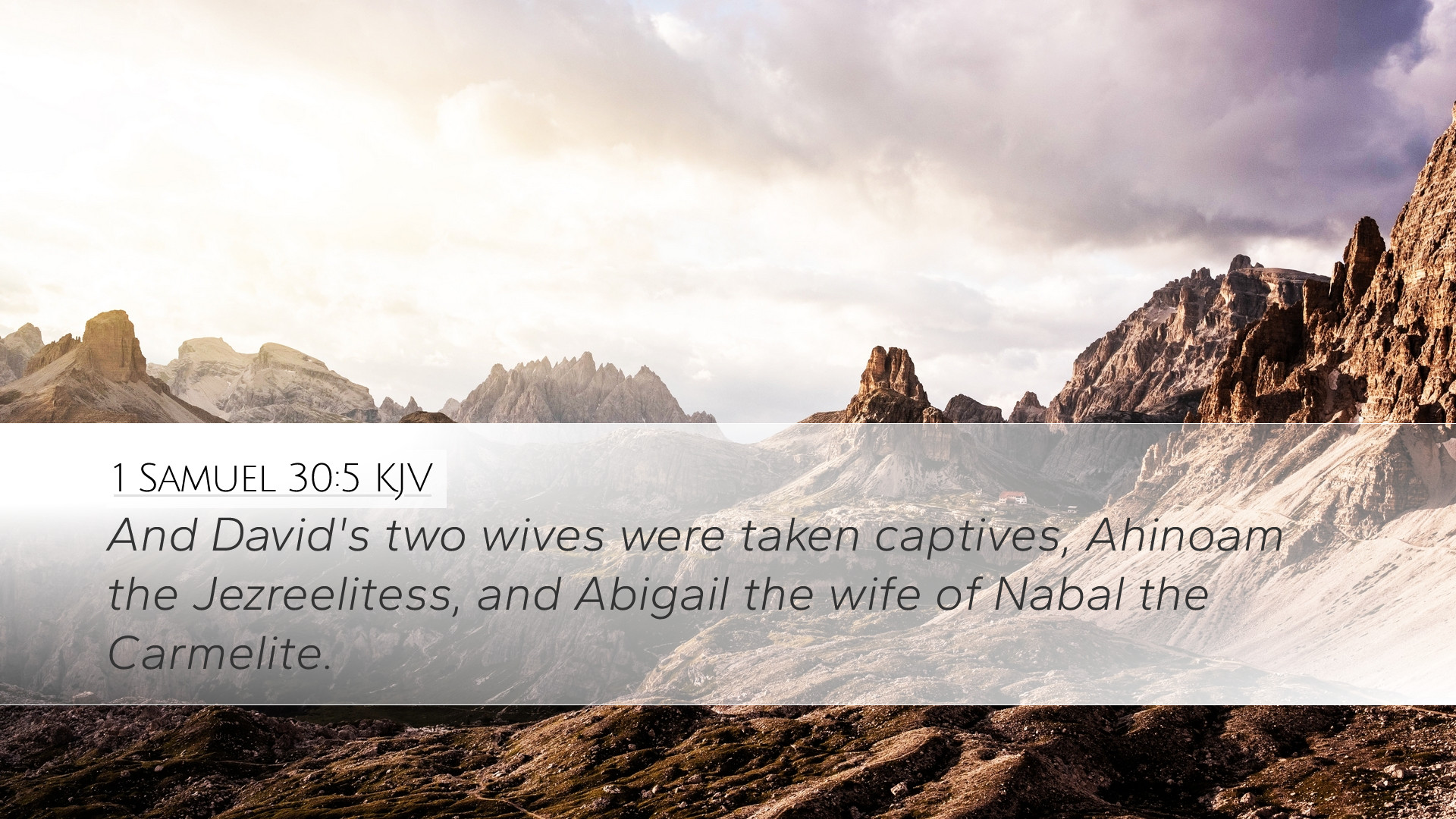Commentary on 1 Samuel 30:5
Bible Verse: "And David’s two wives were taken captive, Ahinoam the Jezreelitess, and Abigail the wife of Nabal the Carmelite." (1 Samuel 30:5)
Introduction
This passage occurs during a tumultuous period in the life of David, as he finds himself in exile and has faced a severe personal crisis. This commentary aims to explore the implications of this verse, integrating insights from established public domain commentators such as Matthew Henry, Albert Barnes, and Adam Clarke.
Contextual Overview
In chapter 30 of 1 Samuel, we come to an intense moment in the narrative where David returns to Ziklag only to find that the Amalekites had raided the city, burned it down, and taken captive the women and children, including his two wives. This sets the stage for David's emotional turmoil and the unfolding of God’s providential care amidst adversity.
Commentary Insights
1. The Significance of Wives Captured
Matthew Henry Commentary: David's wives being taken captive holds deep emotional and psychological significance. He was a man of many responsibilities, not only as a leader but as a husband. Their captivity represents a personal and public loss, symbolizing the broader consequences of David’s current situation.
Albert Barnes Commentary: Barnes notes that the mention of David’s two wives emphasizes their roles not merely as companions but as vital members of David's household. Their abduction signifies a direct attack on David’s family, paralleling the challenges that often face leaders who put their families at risk in the service of the Lord.
2. The Names of David’s Wives
Adam Clarke Commentary: The reference to Ahinoam the Jezreelitess and Abigail the wife of Nabal is purposeful. Ahinoam, whose name means “my brother is delightful,” represents an early stage in David’s life, while Abigail’s name, meaning “my father’s joy,” reflects her wisdom and the favor she found after the death of her first husband. Each wife brings different dynamics to David’s life and leadership.
3. Leadership Impact
Matthew Henry: The capturing of his wives serves as a tremendous test for David's leadership. As his followers, distressed over the loss of their own families, consider turning against him, David stands to prove the nature of his leadership character through faith and dependence on God. This moment suggests that sometimes leaders face crises that must become pivotal moments for strength and resolve.
4. Emotions and Actions
- Grief: The emotional burden on David must be acknowledged. Grief can lead one to despair, but it can also spur positive action.
- Desperation: David's state of mind is critical; he must navigate despair without losing his faith. Clarke suggests that leaders must acknowledge their vulnerabilities.
- Courage and Resolve: The sequence of events shows David turning to God to seek direction. His initial distress takes a transformative turn as he seeks the Lord through prayer.
5. Divine Providence
Albert Barnes: This event is a striking reminder of divine providence in the lives of believers. Despite the evident chaos, God remains in control. David's ensuing actions reveal an important theological truth: even in the midst of personal and communal calamity, God provides the way forward when leaders turn to Him.
6. Application for Today
For Pastors and Leaders: The lesson from David is crucial; leaders must not shy away from their emotions in times of crisis, but rather allow those feelings to drive them toward reliance on God and appropriate action.
For Students and Theologians: This passage opens up discussions on the nature of leadership, the complexities of relationships in the Christian community, and the importance of seeking God in times of trouble.
Conclusion
1 Samuel 30:5 provides a poignant snapshot of leadership under duress. The commentary insights drawn from Henry, Barnes, and Clarke illuminate the profound human and spiritual conflicts inherent in David’s narrative. This text serves as both a historical account and a timeless lesson on the necessity of faith, action, and the role of divine providence in the face of personal and collective adversity.


